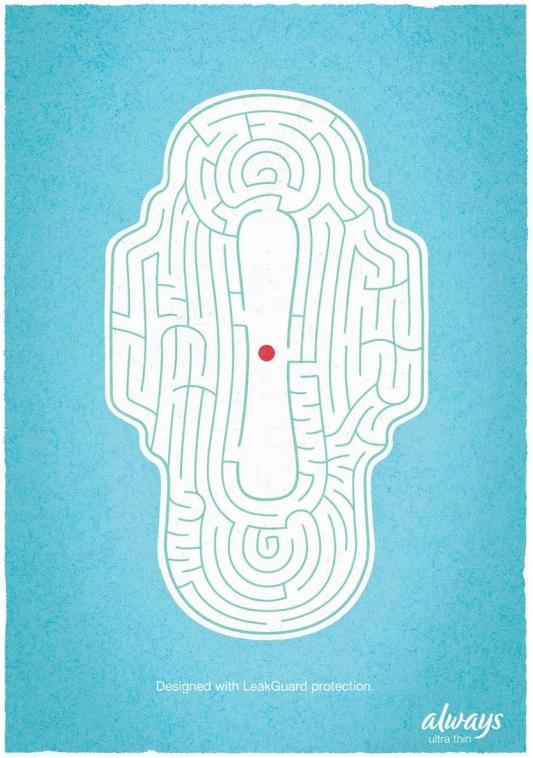After a few intense weeks working on my dissertation I decided to steer clear of my bibliography and have a nosey into the Guardian’s life and style section. After a brief imaginary argument with Mariella I stumbled across a mention of an amazing new American advert for Always sanitary towels, featuring a very small, but very definately red spot.
That’s right people, you read that correctly: some very brave and progressively minded American has made the bold decision to make metaphorical mention of blood in menstrual advertising.
STOP THE PRESSES!!
Ok, I may make light of this, and I know you may laugh, but this is actually pretty big news. I’m sure you’re all familiar with the “ubiquitous blue liquid”, as so many critics describe it, that represents blood as various menstrual products’ resilience is proven by women jumping out of aeroplanes or (even more shockingly) dancing.
Blood and the bleeding body is notoriously absent from not only menstrual advertising, but menstrual discourse in general: popular literature, film, television, and young girls’ and women’s lifestyle magazines. In all its forms, menstrual discourse is conflated with ideas of femininity and acceptable female sexuality, with constant references to hygienic menstrual management and the restrictions we experience in our daily lives as a result of our mischeivous reproductive systems. The process of menstruation is discussed at menarche and menopause as the woman-body enters new phases in life and is assigned a new social and sexual status. But the actual monthly experience of ‘having periods’ is normally absent from menstrual discourse. Instead we find discussion of menstrual management – odour control, avoiding leaks, hiding signs of PMS and other associated discomfort, how to engage in physical activity so that no-one could possibly guess that you were on the blob – all of which require women to publically deny one of the most natural occurances of their bodies. After all, menstruation is simultaneously the absense of pregnancy and the presense of sexual potentiality, and only a fallen woman could possibly find herself in this social void…
The ability to successfully control this particular aspect of the woman-body is synonamous with success as a social woman, one who acts respectively of social tradition and taboo. A failure to control the visibility of menstrual blood is very dangerous, as such a failure has the potential to traumatise our entire understanding of womanhood and disrupt the logic of femininity.
The long standing career of the ubiquitous blue liquid has therefore played a very important role in the sale and consumption of menstrual products. By reinforcing the myth of femininity it has caused generations of women to buy into products that claim to control all of the dreadful menstrual symtoms that may possibly let other people know that shhhhh… I’m on my period. I mean heaven forbid you be sexually mature and not up the duff. What kind of woman does that make you?? You shrew, you dyke, you frigid failure!
Now I’m not suggesting that we get rid of menstrual products and girls just bleed down their legs, ok? I’m not weird. I just think that we need to shake things up with a little bit of menstrual terrorism. No more calling them ‘sanitary products’ for starters – I’m very clean thank you, I just happen to be on my period. And a few less girls thinking that mooncups are gross – they’re the best things ever, and the’re totally environmentally awesome. Or perhaps just laughing about periods and making people acknowledge their bloody existance, like the ‘Adventures in Menstruating’ gals, Chella Quint and Sarah Thomasin.
Of course I don’t expect you to go taking Germaine Greer’s advice and tasting your own menstrual blood in order to assert yourself as a real feminist (after all, who’s she to talk? She’s a shit feminist these days.) Nor do I expect you to start joining in with Ingrid Berthon-Moine’s menstrual art. However, I would like a few less people to think that it’s weird and gross and unhygienic etc etc. What’s weird and gross is pretending that your period is blue, because guess what? My period isn’t blue. And tampon, towel, mooncup or nothing at all, if I want to go dancing I will damn well go dancing.



 Check out this
Check out this